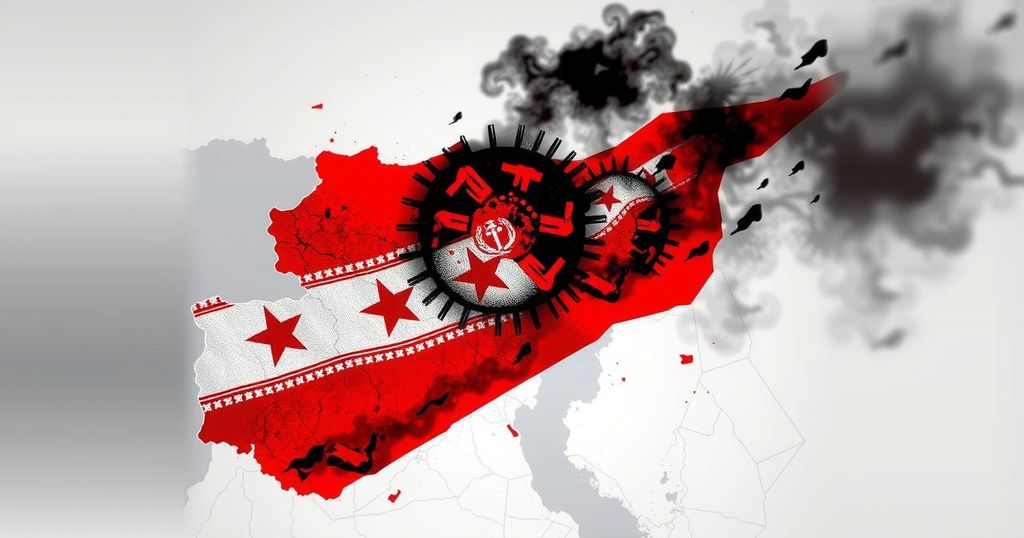The recent ousting of Bashar al-Assad has instigated a shift in power dynamics in Syria, leading to heightened influence from Turkey and significant setbacks for Iran and Russia. The dominant rebel group, Hayat Tahrir al-Sham, seeks to establish control amid a fragmented landscape supported by various international players. The future of Syria hinges on forming a unified government embodying the interests of its diverse populace while addressing ongoing conflicts.
On Sunday, I inquired with a Syrian expatriate at a UK café about the recent news regarding the ousting of Bashar al-Assad, Syria’s long-standing dictator. He expressed a hopeful sentiment for himself and the estimated 7 million Syrians displaced by the ongoing civil war, voicing a desire to return home. Reports indicate that the Assad family has sought refuge in Russia, thus allowing Syrians to freely access his presidential palace, where they have begun to dismantle statues of Hafez al-Assad, Bashar’s father and predecessor.
Syria has become a complex landscape, fragmented into regions dominated by various armed factions, each supported by different international powers, including Russia, Iran, Turkey, the United States, Gulf states, and Israel. The current focus is on the most influential rebel group, Hayat Tahrir al-Sham (HTS), which is based in northwestern Syria’s Idlib province. Since its emergence as an al-Qaeda affiliate in 2011, HTS has evolved, distancing itself from extremist elements and transitioning to prioritize Syrian interests, particularly the removal of Assad and Iranian militias.
The dynamics of the region have shifted significantly due to Turkey’s critical support for HTS and other rebel groups during their recent offensive. Following Assad’s dismissive response to Turkey’s normalization efforts, Ankara provided the necessary backing that allowed these factions to succeed. Given the outcome, Turkey is positioned to play a pivotal role in shaping Syria’s future, with intentions to facilitate the return of Syrian refugees, while also countering Kurdish forces that it perceives as a threat.
Iran faces a significant strategic loss with Assad’s displacement. The removal of its ally means a diminished capability to project its power through Hezbollah and maintain a land route to the Mediterranean, complicating its military operations in the region. This setback is equally profound for Russia, which invested heavily in bolstering Assad’s regime through military interventions. As Russia’s focus shifts to the conflict in Ukraine, its ambition in the Middle East falls into jeopardy.
Looking ahead, the possibility of a unified Syrian state appears bleak unless the various factions can forge a transitional government that reflects the complexities of the nation’s demographics and interests. Attempts at peace negotiations have historically ended in stalemate, leaving Syria divided. The politically fractured landscape also includes the Kurdish-led Syrian Defence Forces (SDF) in the northeast, which continues to receive support from the United States despite Turkey’s objections. Moreover, the Turkish-backed Syrian National Army remains a pivotal player amid ongoing discord among its fragmented groups.
In summary, as significant external influence wanes, it becomes imperative for Syrians to actively participate in the rebuilding of their nation, cultivating a new state that embodies their collective interests and aspirations. Engaging both returning and resident populations in governance will be essential in overcoming the historical divisions that have plagued Syria for over a decade.
The Syrian civil war has resulted in a catastrophic humanitarian crisis, displacing millions and creating a power vacuum filled by various armed groups. The recent events involving the potential ousting of Bashar al-Assad mark a significant turning point in the Syrian conflict, altering the balance of power among regional players such as Turkey, Iran, and Russia, each having vested interests in the outcome of the civil war. The dynamics among these nations, accompanied by the complex factional landscape within Syria, are crucial in understanding the implications of these developments for the region’s stability and future.
The current status in Syria reflects a fragmented nation struggling with diverse armed factions supported by foreign powers. Turkey is likely to assert substantial influence as it seeks to stabilize the region and repel Kurdish forces. Meanwhile, both Iran and Russia experience significant losses regarding their regional aspirations. The international community must recognize the necessity of involving Syrian voices in the rebuilding process, emphasizing the importance of local governance in achieving lasting peace and unity in the war-torn nation.
Original Source: theconversation.com






